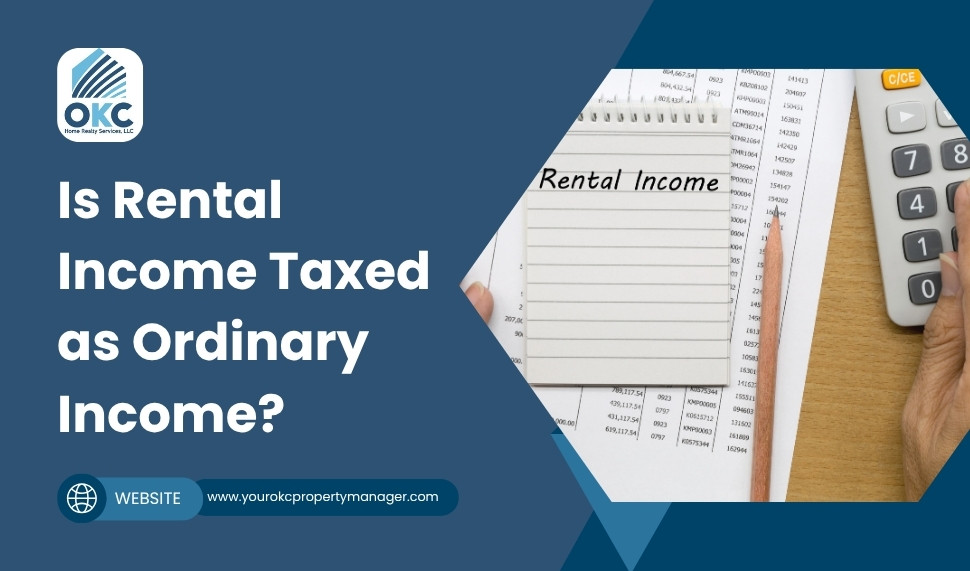Did you know? Rental properties in the U.S. generate hundreds of billions of dollars in income annually, though the IRS does not publish an exact figure for total rental income. In Oklahoma City, about 41% of households are renter-occupied, making it essential for property owners and investors to understand how rental income is taxed.
Whether you’re managing a single-family unit or a portfolio of multi-family homes, one question always comes up: “Is rental income taxed as ordinary income?” In most cases, yes, and if you don’t plan accordingly, you could be leaving money on the table or end up with an unexpected tax bill.
With over 15 years of experience as a seasoned property management professional at OKC Home Realty Services, I’ve seen how a lack of tax knowledge can eat away at your rental profits. I’ll provide you with information about how the IRS views rental income, what counts as taxable, how to report it correctly, and most importantly, what deductions you’re entitled to as a landlord. We’ll also touch on global perspectives.
What Is Ordinary Income and How Does Rental Income Fit In?
Thinking of renting out a property right? It’s important to understand how the IRS(Internal Revenue Service) classifies rental income and how it affects your taxes. While rental income can be a great source of passive income, it’s typically taxed just like the money you earn from a job. Let’s break down what this means and how it applies to you.
Understanding Ordinary Income
Ordinary income refers to all income earned through regular sources like wages, salaries, commissions, and rental payments. It’s called “ordinary” because it comes from routine financial activities rather than one-time investment gains. The IRS taxes ordinary income using a progressive rate system that ranges from 10% to 37% for the 2024 and 2025 tax years, depending on your filing status and total taxable income.
This means that the more you earn, the higher the rate you’ll pay on the upper portion of your income. Unlike capital gains or qualified dividends, which may be taxed at lower, preferential rates, ordinary income is taxed at your full marginal tax rate, which can make a big difference in your overall tax bill.
Rental Income as Ordinary Income
Rental income is defined by the IRS(Internal Revenue Service) as any payment received for the use or occupation of property you own. This includes advance rent payments, current rent, late fees, and even payments for lease cancellations or forfeited security deposits. Unless your rental activity qualifies as a business (such as a real estate business or a corporation like an LLC or S-Corp), rental income is generally taxed as ordinary income and reported on your tax return.
How Is Rental Income Taxed?
If you own a rental property, one of the first questions you might have is: How is rental income taxed? The IRS treats rental income just like the money you earn from a job; it’s considered regular (or “ordinary”) income for tax purposes.
This means when you file your taxes, you’ll need to add your rental income to your other sources of income, like wages, business profits, or dividends. But here’s the good news: you may be eligible to deduct certain expenses related to managing your rental property, and these deductions can help reduce how much tax you owe.
From repairs and maintenance to property management fees and mortgage interest, these qualified deductions can go a long way in lowering your taxable rental income. But after applying those deductions, the remaining profit is taxed just like any other earnings.
Federal Tax Rates on Rental Income
Just like your salary or freelance income, your net rental income, that is, rental income after deductions, is taxed at the federal level based on your ordinary income tax bracket.
Let’s break it down with an example:
Suppose you’re a single filer and your total taxable income in 2024 includes $50,000 in rental income. According to the IRS tax brackets, you’d fall into the 22% tax bracket. Here’s how that works:
- You’d pay $5,425.88 on the first $46,151.
- Then, you’d pay 22% on the amount over $46,151, which is $3,849.
In total, you’d owe around $6,272.66 in federal taxes on your rental income alone. Of course, this example assumes no deductions, so your actual tax liability may be lower depending on your deductible expenses.
State Taxes on Rental Income
On top of federal taxes, your state income taxes may also apply to your rental income. Most states treat rental income as ordinary income, which means it gets lumped in with your salary and other earnings for tax purposes.
But here’s something important to note: some states don’t have an income tax at all. If you own rental property or reside in one of those states, like Florida, Texas, or Nevada, you could avoid state income taxes on your rental profits entirely.
Even if your state does tax rental income, the rules and rates can vary. So, it’s smart to check with a tax professional or your state’s tax authority to understand how your location affects your bottom line.
Reporting Rental Income
When it comes time to file your taxes, you’ll report your rental income and expenses on IRS Form 1040, Schedule E. This form helps break down your income and qualified deductions from rental activities.
If you own multiple rental properties, no problem, you can submit additional copies of Schedule E to include each property’s details.
And if you use a property management company, they’ll usually provide you with a Form 1099-MISC showing the total rent they collected on your behalf. This income needs to be included in your tax return, even if you didn’t directly receive the payments.
Proper record-keeping and filing are essential here as they ensure you’re reporting everything accurately and not missing out on valuable deductions.
What Expenses Can You Deduct from Rental Income?
One of the biggest benefits of owning a rental property is the ability to deduct a wide range of expenses related to its upkeep and management. These deductions help reduce your overall taxable rental income, sometimes even turning a profit on paper into a loss that can offset other types of income.
So, what exactly can you deduct? Let’s break it down:
Mortgage Interest:
If you’ve taken out a mortgage to buy your rental property, the interest you pay on that loan is fully deductible. This is often one of the largest expenses landlords have, especially in the early years of the loan when the majority of your payment goes toward interest rather than principal. The IRS allows you to write off this interest as a business expense, which can make a big dent in your tax bill.
Property Taxes:
Just like with your home, property taxes on your rental property are tax-deductible. Every year, you receive a bill from the local government, and while paying it may sting, the silver lining is that you can deduct the full amount when reporting your rental income. If you’re wondering what the rates look like, here’s a helpful breakdown of the Oklahoma property tax rate. It’s an essential and easy deduction to claim.
Repairs and Maintenance:
Whenever something breaks or needs fixing at your rental, keep the receipts! The costs of repairs and routine maintenance, like fixing a leaky faucet, repainting walls, or patching up the roof, are fully deductible. These expenses help keep your property in good shape and your tenants happy, and the IRS sees them as necessary operating costs.
Depreciation:
Here’s a tax break that often surprises new landlords: You can depreciate the structure of your rental property over a 27.5-year period. This allows you to deduct a portion of the property’s value each year to account for wear and tear, even if you didn’t spend any money that year on improvements. It’s a paper loss, but a very real tax advantage.
Property Management Fees:
If you’ve hired a property management company to handle rent collection, maintenance coordination, tenant screening, or lease enforcement, you can deduct those professional service fees in full. Property management can free up your time, and fortunately, the IRS rewards that delegation by letting you write off the cost.
You May Also Read: How Much Do Property Managers Charge
Advertising and Marketing:
Getting a vacant property rented out isn’t free. Whether you’re running online ads, printing flyers, or paying for professional photography, all costs associated with marketing your rental are considered business expenses. That means they’re deductible, so you can attract quality tenants while keeping your tax liability lower.
Homeowners’ Insurance:
Protecting your property with an insurance policy is a smart and necessary move. The annual or monthly premiums you pay for homeowners’ or landlord insurance are fully deductible. This includes coverage for things like fire, theft, liability, or storm damage. If your policy covers multiple properties, be sure to break out the cost for each.
So, these deductions can significantly lower your taxable rental income, sometimes even resulting in a loss that can offset other income depending on your situation.
How to Report Your Rental Property Income on Your Taxes?
When tax season rolls around, knowing how to properly report your rental property income can save you time, money, and stress. Let’s go through the process so you can stay on the IRS’s good side and make the most of your rental deductions.
Determine Which Forms to Use:
First things first, what forms should you use?
If you own fewer than three rental properties, you’ll report your income and expenses using Form 1040 or 1040-S, Schedule E, Part 1. This is the standard method for listing rental income and the related expenses you’ve incurred throughout the year.
Now, if you’re managing more than three rental properties, don’t worry—you won’t need a whole new method. Instead, you’ll just need to complete multiple Schedule E forms to make sure each property is listed accurately.
Report Accurate Information:
Accuracy matters when dealing with taxes. To report rental income and claim deductions confidently, make sure you’re keeping detailed records of every dollar coming in and going out. The IRS expects you to verify both your rental income and any deductions, so receipts, bank statements, and invoices should be neatly organized and readily available.
Keep in mind if you’re using the property for personal reasons, like as a vacation home or a part-time residence, things get a bit more complicated. In these situations, the IRS may limit your rental deductions, since the property isn’t used solely for rental purposes.
Rental Income Taxation Around the World: A Quick Look at India and Ireland
While this blog focuses on U.S. tax rules, it’s interesting to note that rental income taxation varies globally:
- India: Rental income is taxed under “Income from House Property,” with a standard deduction of 30% allowed for repairs and maintenance. Home loan interest and municipal taxes are also deductible. Under certain conditions, rental income up to Rs. 10 lakh can be tax-free if it is the sole income source.
- Ireland: Rental income is taxed at either 20% or 40%, depending on the taxpayer’s income bracket.
Conclusion on Is Rental Income Taxed as Ordinary Income
Rental income is indeed taxed as ordinary income, subject to the same federal and state tax brackets that apply to wages and salaries. However, the ability to deduct related expenses and depreciation can help reduce your taxable income substantially. Staying informed about how rental income is taxed and properly reporting it can save you money and keep you compliant with tax laws. Whether you’re a new landlord or a seasoned real estate investor, understanding these tax rules is key to optimizing your rental property income.
If you’re looking to maximize your rental income and minimize your tax liability, consider consulting a tax professional like OKC Home Realty Services, who can tailor advice to your specific situation and help you take full advantage of available deductions.
Disclaimer: The article is for information purposes only and does not constitute legal, financial, or tax advice. Tax laws can change, and individual circumstances vary. For personalized guidance, consult a qualified tax professional or financial advisor. OKC Home Realty Services is not responsible for any actions taken based on the information provided herein.
FAQs About Rental Income Taxation
Is rental income always taxed as ordinary income?
Yes, Rental income is taxed as ordinary income unless the rental activity qualifies as a business operation, in which case it may be treated as business income.
Do I have to report all rental income, including late payments and security deposits?
Yes, the IRS requires you to report all rental income, including advance rent, late payments, lease cancellation fees, and forfeited security deposits in the year they are received.
Can I deduct expenses related to my rental property?
Absolutely. You can deduct expenses such as mortgage interest, property taxes, repairs, insurance, and depreciation, which reduce your taxable rental income.
How do I report rental income if I use a property management company?
The management company will send you a Form 1099-MISC showing the total rent collected. You must include this income on your Schedule E when filing your tax return.
Are there any special tax forms for rental income?
Yes, rental income and expenses are reported on Schedule E (Form 1040). If you have more than three rental properties, you can attach additional Schedule E forms as needed.

Author
Scott Nachatilo is an investor, property manager and owner of OKC Home Realty Services – one of the best property management companies in Oklahoma City. His mission is to help landlords and real estate investors to manage their property in Oklahoma.
 (
(









